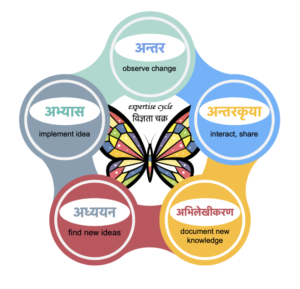Published in the Republica on July 26, 2023 08:30
To truly improve teaching, it is time to take the expert out of training, center professional development back in the classroom, and unleash the power of the practitioner-as-expert–letting such a cycle of expertise replace traditional teacher training.
 A lot more teacher training is taking place in Nepal today than, say, ten years ago. In schools and universities, training programs range from informal one-hour sessions run by teachers to formal multi-day ones organized by institutions. They also range from free and virtual gatherings to lavish retreats at fancy places. Unfortunately, this great development remains characterized mostly by lecture–with hands-on practice being an exception.
A lot more teacher training is taking place in Nepal today than, say, ten years ago. In schools and universities, training programs range from informal one-hour sessions run by teachers to formal multi-day ones organized by institutions. They also range from free and virtual gatherings to lavish retreats at fancy places. Unfortunately, this great development remains characterized mostly by lecture–with hands-on practice being an exception.
There is a reason why teacher training remains entrenched in the old habit of delivering lectures. Both trainers and trainees continue to believe that an expert is needed to “deliver” content, that the key objective of training is to increase knowledge, rather than for trainees to learn by doing, sharing, and experiencing.
In reality, there is little to no practical value of content in training. We might as well train farmers how to improve crop yields by taking them to fancy hotels in the city and give them lectures on how to do it. Even simulated activities and discussions are inadequate. Imagine an agricultural expert taking a group of farmers to a sandbank to show them how to use modern farm equipment. Such an expert can teach how to use the tools, but he won’t really show how to grow a crop.
We need a radical shift in how training is done. Training should not only involve participants in doing things and sharing experience, solving problems and creating materials–not lectures or even discussions. It should also happen right in their classroom, as I will describe. A little bit of content may be needed to set up the context, clarify instructions, or during follow up discussion. But if content takes more than a quarter of a program’s time, it is no longer training.
Skipping the expert
One easy and effective way to make training more like training is to get rid of the expert and use a facilitator instead. The less the facilitator has to say the better. The more she makes time and creates opportunities for participants the better. In fact, when the facilitator tells participants that she is not an expert, and that the participants are the experts–in that they are the ones teaching–the training becomes far more effective. In fact, training becomes even more effective when one of the participating practitioners serves as facilitator. All that the facilitator needs is skills for managing the process and fostering collaboration. In exchange for losing the quantity and depth/breadth of knowledge when losing the external expert, such training can gain far deeper grounding in practice and far deeper commitment and accountability among participants. This shift to expertless training does require courage.




